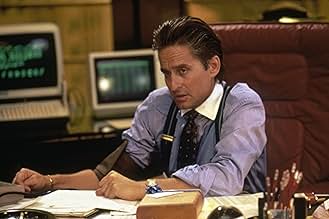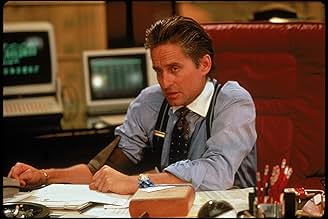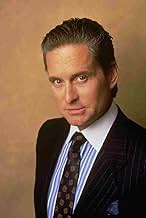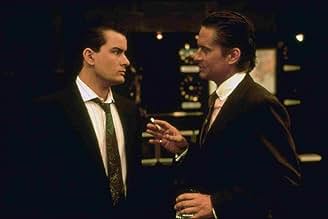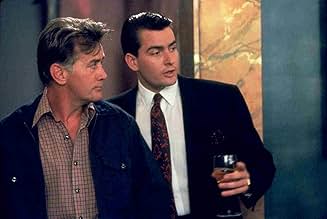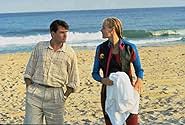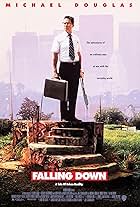An impatient young stockbroker is willing to do anything to get to the top, including trading on illegal inside information taken through a ruthless, greedy corporate raider who takes the yo... Read allAn impatient young stockbroker is willing to do anything to get to the top, including trading on illegal inside information taken through a ruthless, greedy corporate raider who takes the youth under his wing.An impatient young stockbroker is willing to do anything to get to the top, including trading on illegal inside information taken through a ruthless, greedy corporate raider who takes the youth under his wing.
- Won 1 Oscar
- 9 wins & 4 nominations total
- Chuckie
- (as Chuck Pfeifer)
- Director
- Writers
- All cast & crew
- Production, box office & more at IMDbPro
Featured reviews
There are two schools of thought when it comes to money. Some economists argue money is an expanding resource, and prosperity a rising tide that lifts all boats. For Gekko, the truth is simpler and more brutal: The rich get richer off the backs of everyone else. "Money itself isn't lost or made, it's simply transferred," he tells his young protégé Bud Fox (Charlie Sheen).
No question writer-director Oliver Stone feels the same way, as he presents this tale of wealth acquisition at its very apex, lower Manhattan circa 1985. In practically every frame showcasing the opulent world Gekko travels can be glimpsed beggars, fishermen, window washers, people who never will have access to the white-collar lifestyles their lowly status perversely enables for others.
For some, this zero-sum take of America clouds their enjoyment of "Wall Street" the movie. It shouldn't. You don't have to buy Shakespeare's version of history in "Richard III" to enjoy the morally bankrupt character at its center, and you don't need to adopt Stone's philosophy to enjoy Gekko.
In fact Stone's attitude about the Street, presented here as a kind of Hogarth caricature, helps make the film so entertaining. He captures the scenes of floor trading and calls and puts in journalistic detail, but leaves room for the human equation. And he has fun, a lot of fun, especially with Gekko, a character who makes you laugh with his pithy comments even as he sets about using poor Fox as a human ashtray.
On an upcoming charity event for the Bronx Zoo: "That's the thing about WASPs. They hate people, but they love animals." On a rival: "If he was in the funeral business, no one would ever die!" To Fox: "You had what it took to get into my office, sport, the question is do you have what it takes to stay."
Fox wants to stay, and allows no SEC regulation to block his wayward path. Stone's father was a stockbroker, and so the director takes special care to show us that all Wall Streeters aren't bad. There's Hal Holbrook, almost too saintly and somewhat detached from day-to-day business of his brokerage house to the point he seems a slumming B-school don. John C. McGinley delivers a standout performance as a vulgar, greedy friend of Fox's who we nevertheless find ourselves sympathetic to, especially as Fox ditches him for Gekko.
But of course it's really Gekko's world, as we watch him at his desk, punching telephone-line buttons and encouraging subordinates to "rip their throats out," checking his blood pressure with one hand while smoking a cigarette in the other. His centerpiece moment, his speech to the stockholders at Teldar Paper, is a compelling soliloquy not because it showcases his brutality but because it allows him a chance to explain his philosophy in a way that sounds logical, even honorable, until you think through the implications. That's Stone's screen writing at its best.
Sheen is also masterful in his role, playing the naive waif who wants to swim with the sharks and thus giving Douglas daylight to run. Too bad there's a tacked-on romance that never really works, in part because the character of Darien Taylor is not well developed, in part because Darryl Hannah hadn't yet met Quentin Tarantino. The ending is a bit too neat, and loses the subtlety that makes the rest of the film so good.
But the heck with subtlety when you have Gordon Gekko. Douglas is the reason for watching "Wall Street," and a terrific one. Just watch the way he looks at Bud, eyebrows raised to hold a pregnant silence, or enjoys the discomfort of his arbitrager-rival Sir Larry (a solid Terence Stamp). Stone knew what he had here, and makes the most of it. As a twisted morality tale, "Wall Street" is a thrilling, scenic ride down a dark and dangerous road.
Many people associate this film with a liberal versus conservative viewpoint on business, a wild-west economy versus a planned economy and relegate this film to 1980's era nostalgia, like the now humorously giant cell phone Gekko is talking on as he walks along the beach. It is said that neither extreme works and that we've gradually settled towards something in the middle. However, the Gekkos of this world are smarter than that, and over the past 20 plus years they have set up an economic system that serves them well. What we now have is a situation where the haves and have-mores have a planned - almost Soviet - system in which the rules stratify them at the top. I cite the changes in bankruptcy law as exhibit A. The members of the labor force that serve them, however, are in the wild-west economy that was once advocated for everyone. Some will rise to the stratified top in this situation, but the vast majority will remain at the bottom shooting it out with each other - for scarce good jobs, good health care, education, etc. Thus, to me, Wall Street is just an opening chapter in the saga of how economic forces and attitudes toward them have changed, not the portrait of a 25 year-old fad that has come and gone.
The film follows a low level day trader (Charlie Sheen) who strives to become a very powerful figure on Wall Street like his idol Gordon Geckko (Michael Douglas). To justify his rise to power, he uses his father (Martin Sheen) knowledge of the flight industry for his own personnel gains. He wants to get his foot into the door of the oily Geckko. Will he sell his soul for a quick buck? How far and fast will this rising star soar? To find these answers check out Wall Street.
This film was made immediately after Platoon. Stone made it clear that he wasn't going to let an Oscar winning malaise effect him. He explores the two fathers theme that he used in Platton and once again makes it work. A highly underrated film that has sadly been neglected by the mainstream audience. What makes it even sadder is the fact that it still applies today.
Highly recommended.
In today's dumbed down movie world, Gordon Gekko could have been scripted and played exactly the same except for one thing: you'd never see the scene when he suddenly stops to admire the ocean at dawn. Fortunately Michael Douglas clearly added his own dimensions to the character whom, if left to Stone, would have been a cardboard money-grabber. As far as Stone is concerned Gekko wants money for its own sake, but Michael Douglas manages to evince a man who revels in the power and influence that money gets him. Stone's dialogue actually undercuts this perception on occasion, as when Bud Fox yells at Gekko, "How many yachts can you sail!?", and when Gekko, enticing Fox by outlining how rich he could be, says, "Rich enough to have your own jet" - as if owning a jet wasn't the minimum accoutrement you'd expect from the least successful company director or minor pop star. Other infelicities in the script include the moment when Stone wanted to signal that Bud Fox has reached the peak of success and found it empty: following the montage of the condo purchase and decoration, the perfect meal for two, culminating in making love to Daryl Hannah, Stone has Fox standing on his balcony, and apropos of nothing at all, he just says, "Who am I?" It has to be said that Sheen wasn't really up to the task of delivering this atrocious line.
I've rarely seen a film in which the female lead was so comprehensively abandoned by the director. Stone clearly wanted to focus all his attention on Sheen and crucially on Douglas, leaving Hannah floundering and unable to clearly express just how much into Bud Fox her character is at any one time. At the final break-up you almost hear Stone's sigh of relief at being able to get rid of the irrelevant female (probably forced on him by the studio) and concentrate on the man's world of stockbroking.
I seem to be finding a lot of flaws in what is basically a most compelling and watchable film. Despite the complex jargon-riddled technicalities of the subject matter, the movie's plot grabs hold of the viewer from the first scene and never lets go. Of course Douglas dominates most of the movie, until Fox sr. (Sheen sr.) throws the spanner in the works of his son's airline deal. Thank heavens Charlie Sheen took the unbelievably courageous decision to have his own father (instead of Jack Lemmon) play his character's father because the two of them perform an absolute barnstormer of a scene in which every word, inflexion and facial expression is repleat with absolute truth; and it's all the more poignant considering Charlie Sheen's own personal difficulties which faced him in later years, and the well-publicised ups and downs of his relationship with Martin as a result. Had those troubled times preceded this movie, it's hard to imagine the performances could have been any different - that's how good they are.
Fantastic character support comes from Hal Holbrook, the always reliable Saul Rubinek and John C. McGinley (who does not seem to have changed at all in the intervening years!), a young James Spader and the magisterial Terence Stamp who understands the unutterable menace with which it is possible to lace the single word "Mate".
Did you know
- TriviaThe first feature film to show a character using a mobile cellular telephone.
- GoofsAt the beginning of the movie, Bud Fox and Marvin say Gordon Gekko was shorting NASA stock right after the Challenger explosion. The scene is set in 1985, but the Space Shuttle Challenger exploded January 28, 1986.
- Quotes
Gordon Gekko: The richest one percent of this country owns half our country's wealth, five trillion dollars. One third of that comes from hard work, two thirds comes from inheritance, interest on interest accumulating to widows and idiot sons and what I do, stock and real estate speculation. It's bullshit. You got ninety percent of the American public out there with little or no net worth. I create nothing. I own. We make the rules, pal. The news, war, peace, famine, upheaval, the price per paper clip. We pick that rabbit out of the hat while everybody sits out there wondering how the hell we did it. Now you're not naive enough to think we're living in a democracy, are you buddy? It's the free market. And you're a part of it. You've got that killer instinct. Stick around pal, I've still got a lot to teach you.
- Crazy creditsBuilding illustrations are shown during entire end credits
- Alternate versionsIn the VHS release, instead of the correct 1981-1994 20th Century Fox logo, the 1953-1981 logo is used.
- ConnectionsFeatured in Siskel & Ebert: The Duxorcist/Walker/Manon of the Spring/The Dead (1987)
- SoundtracksFly Me to the Moon
Words and Music by Bart Howard (ASCAP)
Published by The Hampshire House Publishing Corp. (ASCAP)
Performed by Frank Sinatra
Courtesy of Reprise Records
By Arrangement with Warner Special Products
Arrangement by Quincy Jones (uncredited)
Details
- Release date
- Country of origin
- Official site
- Language
- Also known as
- El poder y la avaricia
- Filming locations
- 60 W. 75th St, New York City, New York, USA(Bud's first apartment building)
- Production companies
- See more company credits at IMDbPro
Box office
- Budget
- $15,000,000 (estimated)
- Gross US & Canada
- $43,848,069
- Opening weekend US & Canada
- $4,104,611
- Dec 13, 1987
- Gross worldwide
- $43,848,069
- Runtime2 hours 6 minutes
- Color
- Sound mix
- Aspect ratio
- 1.85 : 1
Contribute to this page





